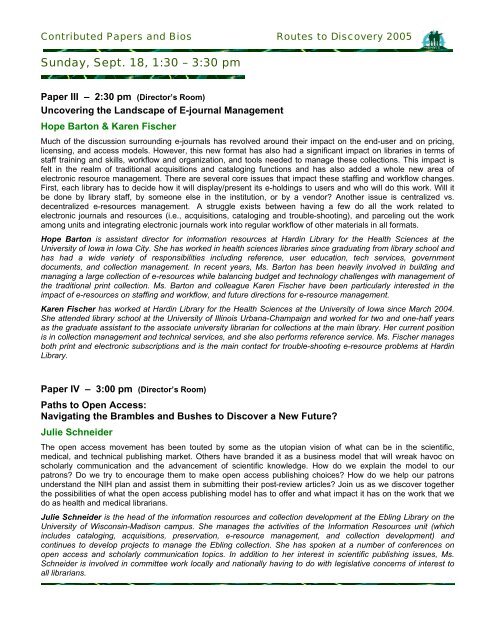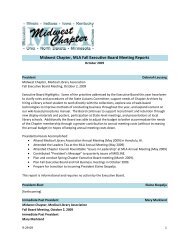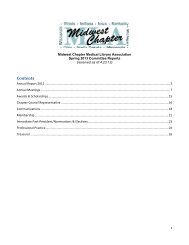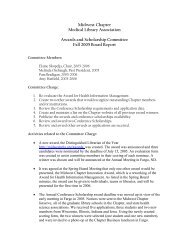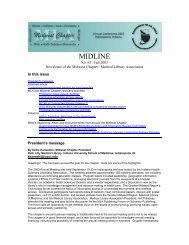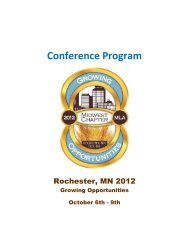the final program updated September 2. - Midwest Chapter MLA
the final program updated September 2. - Midwest Chapter MLA
the final program updated September 2. - Midwest Chapter MLA
You also want an ePaper? Increase the reach of your titles
YUMPU automatically turns print PDFs into web optimized ePapers that Google loves.
Contributed Papers and Bios Routes to Discovery 2005<br />
Sunday, Sept. 18, 1:30 – 3:30 pm<br />
Paper III – 2:30 pm (Director’s Room)<br />
Uncovering <strong>the</strong> Landscape of E-journal Management<br />
Hope Barton & Karen Fischer<br />
Much of <strong>the</strong> discussion surrounding e-journals has revolved around <strong>the</strong>ir impact on <strong>the</strong> end-user and on pricing,<br />
licensing, and access models. However, this new format has also had a significant impact on libraries in terms of<br />
staff training and skills, workflow and organization, and tools needed to manage <strong>the</strong>se collections. This impact is<br />
felt in <strong>the</strong> realm of traditional acquisitions and cataloging functions and has also added a whole new area of<br />
electronic resource management. There are several core issues that impact <strong>the</strong>se staffing and workflow changes.<br />
First, each library has to decide how it will display/present its e-holdings to users and who will do this work. Will it<br />
be done by library staff, by someone else in <strong>the</strong> institution, or by a vendor? Ano<strong>the</strong>r issue is centralized vs.<br />
decentralized e-resources management. A struggle exists between having a few do all <strong>the</strong> work related to<br />
electronic journals and resources (i.e., acquisitions, cataloging and trouble-shooting), and parceling out <strong>the</strong> work<br />
among units and integrating electronic journals work into regular workflow of o<strong>the</strong>r materials in all formats.<br />
Hope Barton is assistant director for information resources at Hardin Library for <strong>the</strong> Health Sciences at <strong>the</strong><br />
University of Iowa in Iowa City. She has worked in health sciences libraries since graduating from library school and<br />
has had a wide variety of responsibilities including reference, user education, tech services, government<br />
documents, and collection management. In recent years, Ms. Barton has been heavily involved in building and<br />
managing a large collection of e-resources while balancing budget and technology challenges with management of<br />
<strong>the</strong> traditional print collection. Ms. Barton and colleague Karen Fischer have been particularly interested in <strong>the</strong><br />
impact of e-resources on staffing and workflow, and future directions for e-resource management.<br />
Karen Fischer has worked at Hardin Library for <strong>the</strong> Health Sciences at <strong>the</strong> University of Iowa since March 2004.<br />
She attended library school at <strong>the</strong> University of Illinois Urbana-Champaign and worked for two and one-half years<br />
as <strong>the</strong> graduate assistant to <strong>the</strong> associate university librarian for collections at <strong>the</strong> main library. Her current position<br />
is in collection management and technical services, and she also performs reference service. Ms. Fischer manages<br />
both print and electronic subscriptions and is <strong>the</strong> main contact for trouble-shooting e-resource problems at Hardin<br />
Library.<br />
Paper IV – 3:00 pm (Director’s Room)<br />
Paths to Open Access:<br />
Navigating <strong>the</strong> Brambles and Bushes to Discover a New Future?<br />
Julie Schneider<br />
The open access movement has been touted by some as <strong>the</strong> utopian vision of what can be in <strong>the</strong> scientific,<br />
medical, and technical publishing market. O<strong>the</strong>rs have branded it as a business model that will wreak havoc on<br />
scholarly communication and <strong>the</strong> advancement of scientific knowledge. How do we explain <strong>the</strong> model to our<br />
patrons? Do we try to encourage <strong>the</strong>m to make open access publishing choices? How do we help our patrons<br />
understand <strong>the</strong> NIH plan and assist <strong>the</strong>m in submitting <strong>the</strong>ir post-review articles? Join us as we discover toge<strong>the</strong>r<br />
<strong>the</strong> possibilities of what <strong>the</strong> open access publishing model has to offer and what impact it has on <strong>the</strong> work that we<br />
do as health and medical librarians.<br />
Julie Schneider is <strong>the</strong> head of <strong>the</strong> information resources and collection development at <strong>the</strong> Ebling Library on <strong>the</strong><br />
University of Wisconsin-Madison campus. She manages <strong>the</strong> activities of <strong>the</strong> Information Resources unit (which<br />
includes cataloging, acquisitions, preservation, e-resource management, and collection development) and<br />
continues to develop projects to manage <strong>the</strong> Ebling collection. She has spoken at a number of conferences on<br />
open access and scholarly communication topics. In addition to her interest in scientific publishing issues, Ms.<br />
Schneider is involved in committee work locally and nationally having to do with legislative concerns of interest to<br />
all librarians.


